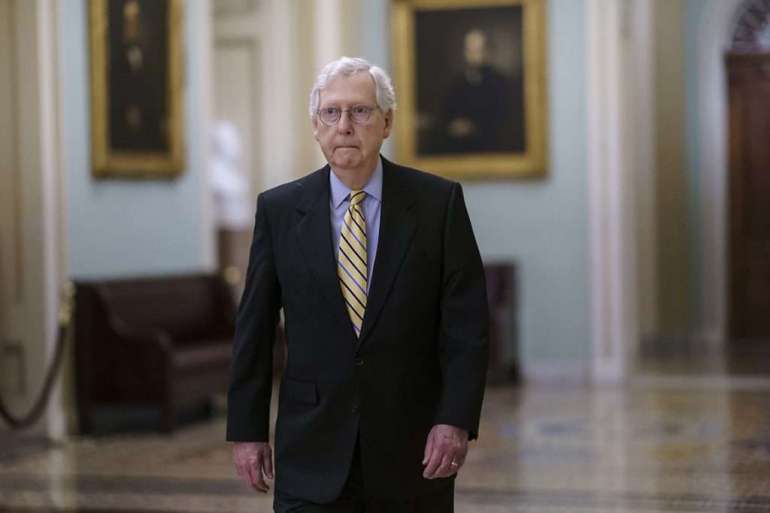‘One hell of a fight,’ all night: Senate vote-a-rama jump-starts $3.5T plan

The vote-a-rama will culminate with a final roll call — likely in the wee hours of Wednesday morning — on adoption of a 92-page framework for Democrats’ $3.5 trillion package of climate and social initiatives, including subsidized child care, expanded Medicare and paid family and medical leave benefits. Adoption of the budget measure will unlock the reconciliation process, which empowers the majority party to eventually clear the final bill with just 51 votes in the Senate, rather than the usual 60-vote hurdle.
House Majority Leader Steny Hoyer said the lower chamber will return from recess early in order to take up the budget resolution during the week of Aug. 23.
Sen. Lindsey Graham (R-S.C.), speaking on the floor for the first time since his breakthrough Covid infection, promised an unpleasant evening for Democrats as political punishment for proposing a budget measure he called “a dream for those who want to socialize America.”
“Yes, sir. We’re going to have one hell of a fight,” said Graham, the top Republican on the Senate Budget Committee. “I don’t know how long we’re going to be here, but as long as it takes. America is worth fighting for, and America as we know it is at risk in this budget resolution.”
Right off the bat, Democrats joined Republicans in unanimously adopting a non-binding provision, offered by Sen. John Barrasso (R-Wyo.), to reject any effort under the Green New Deal that would “ship” U.S. jobs overseas, send electricity and gas prices “soaring” or make the nation “increasingly dependent on foreign supply chains.”
Senate Budget Chair Bernie Sanders (I-Vt.) said he had “no problem” supporting the GOP amendment because it “has nothing to do with the Green New Deal!”
Later, Democrats sidestepped more drama by unanimously backing a Republican amendment from Sen. Tommy Tuberville (R-Ala.) that opposed defunding the police. In a moment of levity before the vote, Sen. Cory Booker (D-N.J.) voiced enthusiastic approval, stressing that all senators should go on the record about their support for funding the police, their belief “in God, country and apple pie.”
In the same vein, nearly every Democrat backed a GOP amendment that would prohibit tax hikes in violation of President Joe Biden’s pledge to not raise taxes on people making less than $400,000 per year.
As the hour approached midnight, the Senate narrowly adopted a Republican messaging amendment aimed at preserving a longstanding ban on federal funding for abortion, which House Democrats eliminated from their annual spending bills this year. Moderate Sen. Joe Manchin (D-W.Va.), a long-time supporter of the so-called Hyde amendment, was the only Democrat to break ranks and support the provision.
Lawmakers unanimously adopted a provision from Senate Minority Whip John Thune (R-S.D.) that targets a Democratic plan to go after dynastic wealth. The amendment opposes an end to the tax exemption that allows the wealthy to pass assets on to heirs tax-free by forgiving capital gains taxes on things like company stock and land when people die. The Biden administration is proposing to allow farms and small businesses to postpone paying the tax until the business or farm is sold or ceases to be family-owned and operated.
Every senator also backed an amendment from Sen. Amy Klobuchar (D-Minn.) that seeks to recognize the law enforcement officers who fought and died protecting the Capitol Building during the Jan. 6 insurrection.
The amendment marathon will be the Senate’s third this year, after Democrats deployed the reconciliation process to pass Biden’s $1.9 trillion pandemic relief package in March.
After Tuesday’s vote-a-rama ends, Democrats are expected to approve the budget resolution that once again launches the privileged process for final passage of their social spending bill.
But before that massive party-line measure can be sent off to Biden in the coming months, the Senate will have to endure at least one more vote-a-rama — an ordeal that could potentially be more painful than the amendment spree this week, since trillions of dollars in Democratic priorities will be closer to the finish line and senators will be proposing tweaks to a much fuller legislative text than the budget framework currently under consideration.
The latest torment follows the long-awaited release of Democrats’ $3.5 trillion budget framework on Monday — a price tag that might ultimately have to come down to appease Senate moderates. The budget measure instructs a swath of committees to begin drafting the pieces of Biden’s plan, with a flexible deadline of Sept. 15.
Earlier Tuesday, the Senate voted 69-30 to pass a $550 billion bipartisan infrastructure bill. Democratic leaders have pledged to move the infrastructure package and their party-line reconciliation measure along two tracks at the same time, tying together the success of both bills.
Democrats’ multitrillion-dollar spending package would bolster Medicare to cover vision, dental and hearing benefits for seniors. It aims to extend Medicaid to Americans in Republican-led states that have refused to expand the health program for low-income individuals. And it would keep new Obamacare subsidies, too, and make in-home care available to more people.
To help offset the cost of the plan, Democrats are proposing to raise taxes on top earners, corporations, overseas profits and capital gains.
The measure also instructs the Senate Judiciary Committee to find a pathway to citizenship for undocumented immigrants. That directive could ultimately run into resistance from the Senate parliamentarian — the upper chamber’s procedural referee — who will decide which provisions pass muster with certain reconciliation restrictions.
Democrats did not include a debt ceiling increase in their budget resolution, instead daring Republicans to reject a bipartisan solution to the cap on the nation’s borrowing authority. In a letter released on Tuesday, 46 Senate Republicans promised to oppose a debt limit hike.
The Treasury Department is expected to run out of money sometime from September to November.
Toby Eckert contributed to this report.